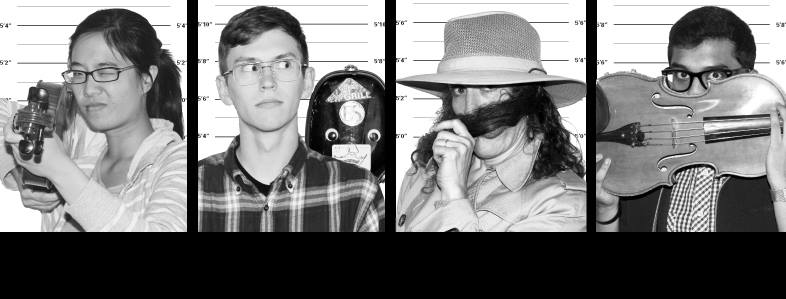The University Symphony Orchestra (USO) will kick off its 2014–15 season with its annual Halloween Concert this Saturday.
The Halloween Concert is perhaps the most popular of the six concerts presented by the USO each year, and, in true UChicago fashion, it is known for an unorthodox twist: Both musicians and audience members are encouraged to forgo the stuffy, button-down attire so often associated with the concert hall and come in costume instead.
“With the Halloween Concert, I try to pick themes that have some relation to Halloween tradition, but [also] provide an opportunity to present some standard repertoire,” music director Barbara Schubert said.
This year, the concert theme is “Classified.” The night’s program includes music from a handful of spy and thriller films and features the Hyde Park School of Dance in a collaborative performance of Edward Elgar’s Enigma Variations, the evening’s centerpiece.
Elgar composed the variations in 1899. Each variation was written with one of Elgar’s friends in mind: For example, the rapid-fire second variation, in the style of a toccata, is meant to represent a pianist who was known for his dexterous preparatory scales. The fourth and 12th variations—which feature solos for viola and cello, respectively—are dedicated to friends of Elgar’s who played those instruments.
“I’ve played the Enigma Variations once before, and it’s been much richer playing it the second time,” observed Aaron Hollander, a fifth-year Ph.D. student and bassoonist in the orchestra. “There’s a lot of complicated rhythm, a lot of exquisite melody . . . I think Nimrod [the piece’s lyrical ninth movement] is what everyone sort of remembers. That’s always been one that’s stuck with me.”
For many years, identifying the dedicatees was the variations’ central “enigma”: In the manuscript, the identities of Elgar’s friends are concealed by their initials or by a clever pseudonym that precedes the variation. Though all of the dedicatees have since been identified, there is still a mystery at the heart of Variations that baffles music scholars: what exactly is the theme from which the Enigma Variations derive?
“There’s been a whole lot of speculation on what the main theme is,” Schubert said. “[Elgar himself] said it was an original theme, others think it’s based on Ein feste Burg ist unser Gott [a hymn by Martin Luther], some people think it’s based on another folk tune. Again, it’s a level of obscurity or mystery—something that’s hidden that you’re left to discover.”
Schubert is looking forward to the season ahead and says that this year’s ensemble is one to watch. “It’s stronger than ever,” Schubert said of the USO. “All across the board, it’s a really talented group.”
This year’s USO musicians were hand-selected by Schubert after a round of competitive auditions at the end of September. The group is not just musically diverse: The USO counts everyone from first-years to tenured faculty members among its ranks.
“The average listener may not realize how much of what they hear in the movies has its foundation in classical music of the late 19th and early 20th centuries,” Schubert said. “All of the music they hear and like so much is essentially derivative from classical composers. So, we have fun with it, but we’re certainly trying to point out the common realm of expression between the two genres.”
“Having fun with it” may be something of an understatement. Musicians in the orchestra maintain that the Halloween Concert is one of the most exciting of the year, not least of all because Schubert herself participates in the antics.
“Barbara always has the wildest entrances,” Hollander says. “Whatever she comes up with, it’s sure to be a blast.”
“Once she was Michael Jackson and she actually did the dance with the Hyde Park School of Dance,” recalled third-year Ph.D. student and violinist Lindsay Wright. “Another year she fought a Chinese dragon-style two-person rodeo horse for the baton [during Rossini’s William Tell Overture].” The result? “She won—thank God.”
Performances will be at 7 and 9 p.m. at Mandel Hall. Suggested donations at the door are $8 for general admission and $4 for students and children.









